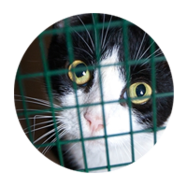Pet ID tags save lives
Author: Pet Welfare Foundation

Having a Pet ID tag could save your dogs life
Pets go missing far more often than most people think. Studies show that over a five-year period, as many as 10-15% of owners go through the heartbreak of losing their pet.
When Sarah’s beloved cat Merlin went missing, she knew his life was in danger – and that she just had days to find him.Sarah loved Merlin dearly – they had been together for nearly 15 years. Merlin was elderly and on medication, so when he went missing, Sarah was frantic.
Although Merlin was microchipped, days passed with no sign of him. Here’s why.
Merlin was found by a neighbour, hiding in her backyard just five houses away from home. According to research by theAustralian Pet Welfare Foundation’s Emeritus Professor Jacquie Rand, this is typical. 75% of lost cats that are later found are within 500 metres of their home. So close – yet so far.
Merlin was microchipped, but not wearing an ID tag. Unfortunately, the information on a microchip can only be read with a scanner – and it’s usually only vets, shelters and council pounds who have them. Because Sarah’s neighbour didn’t know who Merlin belonged to, she called the pound, who sent an animal control officer to pick him up.
At the pound, Merlin was scanned and his microchip found. But there was another problem – Merlin’s microchip still had the contact details for the organisation Sarah adopted him from, nearly 15 years earlier. Believe it or not, this is very common. Professor Rand’s research found that a staggering 37% of microchips in dogs and cats have incorrect contact details recorded on the data base, while others have disconnected numbers listed, or even chips that have not been registered.
Without proper ID, Merlin’s life was in danger. In many states of Australia, unidentified lost pets can be euthanased after just 72 hours – and some pounds euthanased more than 85% of cats. You can help save the lives of cats like Merlin, and get them safely back to their owners. [Read more]
Eventually Sarah was contacted by the council pound. Thankfully, the shelter where she’d adopted Merlin had been able to track down her details.Sarah raced to the pound to get Merlin, but found him desperately ill. Without his medication, his kidneys and heart had deteriorated very quickly. She rushed him straight to her vet, where she was just in time for emergency treatment to save his life. One more day, and she’d have lost Merlin forever.
With a tag, Sarah’s neighbour could have called her on the day she found him, getting him safely home before his life-threatening trip to the pound.
For a lost pet like Merlin, a collar and ID tag with the correct phone number can be a lifesaver.
Five ways to keep your pet safe
1) Make sure your pet is wearing an ID tag with your correct phone number so it can be returned quickly if it is found.
2) Make sure your pet has a registered microchip with the correct details. Only 5% of cats with no microchip, and 33%
of those with incorrect details, make it back to their owners. If you know your pet’s microchip number, you can
check your contact details through Pet Address.
3) Cats tolerate collars better than their owners expect. Regularly check that your cat’s collar fits snuggly, so they
can’t accidentally catch a paw or their mouth in it.
4) Even if your pet lives indoors, they still need to wear an id tag – an amazing 40% of lost cats are indoor-only pets,
with no access to the outdoors.
5) If your cat goes missing, ask neighbours if you can search their property.
About The Australian Pet Welfare Foundation
The Australian Pet Welfare Foundation is a charitable organisation that exists to make a difference to the health and welfare of pets in our community. Our vision is to create a world where:
- pets live longer, healthier and happier lives in a forever home
- human-animal relationships are enriched, for the benefit of pets and people.
We are working to get Australia to zero euthanasia of adoptable and treatable pets in the next five years. Please will you donate today, to help us save over 100,000 dogs and cats each year. We improve the health and welfare of companion animals by creating new knowledge through research. We share that knowledge with the community, shelters and pounds, state and local governments and veterinarians, to create change to save lives.
We are supported by a range of highly experienced, passionate researchers and a dedicated team of volunteers.
Aussie Companion and the Benefits it gives for your Parrots
Birds are picky eaters and they get sick if they are not well fed or if they are not given a balanced meal, bird owners need to know the best bird product suppliers in order to provide the best supplies for their pet birds, because they only deserve the best. In this article we will learn about ...









